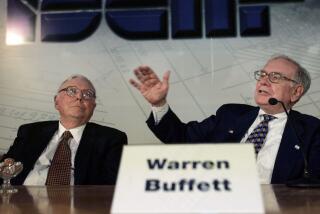Buffett Posts Negative Outlook in Annual Letter
- Share via
NEW YORK — Billionaire investor Warren Buffett issued a pessimistic outlook on the world, saying the war on terror could never be won--a potential problem for his insurance interests--and warning that returns from the stock market over the next few years look meager.
Buffett also said 2001 earnings of Berkshire Hathaway Inc., the insurance and investment company he controls, fell 76% as it absorbed losses from the Sept. 11 terrorist attacks and the recession.
Buffett, known as the “Oracle of Omaha” for his astute investments, also blasted executives for taking millions of dollars out of businesses even as they fare badly, a practice he said went far beyond Enron Corp., the collapsed energy trader.
Buffett, 71, second only to Microsoft Corp.’s Bill Gates among the world’s multibillionaires, made his remarks in his annual letter to shareholders of his Berkshire Hathaway Inc.
The letter was published on the company’s Web site (www .berkshirehathaway.com) Saturday.
Omaha-based Berkshire--a group of 50 or so operating companies, chiefly in insurance, that generate money for Buffett to invest--had a tough year in 2001. It reported drastically lower net profit, cut by a whopping $2.4 billion in claims from the Sept. 11 destruction of the World Trade Center by two hijacked airliners.
The company’s net income fell to $795 million, or $521 a share, from $3.3 billion, or $2,185 a share, a year earlier.
Berkshire reported realized gains of $842 million, compared with $2.4 billion a year ago. Berkshire posted an operating loss of $47 million, compared with profit of $936 million.
Buffett said that further terror attacks on the United States were possible and must be accounted for by insurers.
“Fear may recede with time, but the danger won’t,” Buffett said. “The war against terrorism can never be won. The best the nation can achieve is a long succession of stalemates.”
Working on that assumption, Buffett said his reinsurance operations, including General Re--the largest reinsurer in the United States--would underwrite only some coverage for terrorist attacks, including some third-party liability coverage for airlines.
Buffett once again called on the government to back up insurers covering terror risks, though that seems unlikely.
“Only the U.S. government has the resources to absorb such a blow,” Buffett said.
“If it is unwilling to do so on a prospective basis, the general citizenry must bear its own risks and count on the government to come to its rescue after a disaster occurs.”
That essentially means that without government support, insurers will exclude terror coverage in most policies, a trend that already is hurting policyholders, especially in real estate.
Buffett saw the size of his stock portfolio plummet last year, to about $29 billion from nearly $38billion the year before, mostly because of wilting prices.
Buffett’s major long-standing holdings, including American Express Co. and Coca-Cola Co., lost billions of dollars in value.
“Our restrained enthusiasm for these securities is matched by decidedly lukewarm feelings about the prospects for stocks in general over the next decade or so,” Buffett said in his letter, on behalf of himself and business partner Charlie Munger.
“Today’s equity prices presage only moderate returns for investors,” Buffett warned those looking for outsize returns. “The market outperformed business for a very long period, and that phenomenon had to end. A market that no more than parallels business progress, however, is likely to leave many investors disappointed, particularly those relatively new to the game.”
Buffett also returned to a favorite theme--the shabby ethics of many businesses in the United States--encapsulated by the tech bubble and the fall of Enron.
“Charlie and I are disgusted by the situation, so common in the last few years, in which shareholders have suffered billions in losses while the CEOs, promoters and other higher-ups who fathered these disasters have walked away with extraordinary wealth,” he said.
Buffett repeated his long-held promise that he will never sell any of his 31% share in Berkshire, taking the rough with the smooth along with other shareholders. Buffett’s stake in Berkshire is worth about $34 billion, which he says is 99% of his net worth.
“Many of these people were urging investors to buy shares while concurrently dumping their own, sometimes using methods that hid their actions,” Buffett said, making an implicit criticism of Enron. “To their shame, these business leaders view shareholders as patsies, not partners.”
Enron has become the symbol for shareholder abuse, Buffett said, but “there is no shortage of egregious conduct elsewhere in corporate America.”
More to Read
Inside the business of entertainment
The Wide Shot brings you news, analysis and insights on everything from streaming wars to production — and what it all means for the future.
You may occasionally receive promotional content from the Los Angeles Times.










